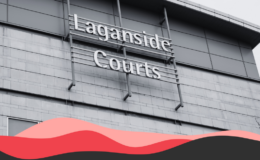- The North Antrim MLA told party colleagues there were seven reasons why Stormont cannot and must not return, as long as the Protocol remains in place. The reasons are a mixture of factual assertions, political rhetoric and opinion.
- He said Stormont would have to implement laws it didn’t make and cannot change, which is broadly accurate.
- However, he also said the Protocol partitions the UK (it doesn’t) and aligns NI economically with Ireland (which isn’t quite accurate either).
- Mr Allister said that, once in place, the Protocol will never change when, actually, the ability to change is woven into the Protocol by design.
- A further claim was that the Protocol suspends Article 6 of the Act of Union. This isn’t quite true. Article 6 was “modified” by the Protocol, and this modification amounts to the suspension of certain parts of the article, the rest of which remains in force.
- The TUV Leader said that the breakdown of seats in the Assembly means it could only ever be an aid and not a hindrance to the Protocol. However, implementation of the Protocol is the legal responsibility of Westminster, not Stormont, and NI’s political institutions lack real authority over its implementation. Also: elections happen and the strength of parties can change.
Speaking on 13 September to the Traditional Unionist Voice (TUV) Central Council, party leader Jim Allister MLA said there are seven reasons why Stormont “must not return so long as the Protocol (or Windsor Framework) remains”:
- The Assembly would have to implement foreign laws it didn’t make and can’t change. It would be a slave of EU colonial rule.
- It would have to operate with the Irish Sea border, partitioning the United Kingdom and aligning NI economically with the Republic.
- It could not make or secure any changes to the Protocol; any such proposal would be blocked by the Sinn Fein veto.
- Once Stormont operates the Protocol it will never change, but its suspension of Art 6 of the Acts of Union would have the boost of unionist assent.
- To operate Stormont under the Protocol is to accept that never again will NI be a full part of the UK, but rather is part of an evolving all-Ireland.
- It is no coincidence that the loudest voices demanding the return of Stormont are those whose mission, like their IRA before them, is to fully detach us from the UK.
- Now that the ‘rigorous implementers’ hold the majority in Stormont, it would inevitably be an aid, not an obstacle, to Protocol rule.
This language blends subjective positions with objective claims. This article focuses on the latter. It is entirely valid for political speech to include opinions or rhetoric but these are not verifiable or fact checkable.
This check looks in detail at TUV reasons one, two, four and seven. There is some overlap in detail between these claims – we’ve tried to avoid repetition.
As reasons three, five and six offered by the TUV are more speculative they are harder to refute or verify, and are therefore not addressed here directly – for instance, reason three: “any such proposal would be blocked by the Sinn Féin veto”. We cannot fact check the future.
- Reason one
The Assembly would have to implement foreign laws it didn’t make and can’t change. It would be a slave of EU colonial rule.
Factual claim: due to the Protocol, a restored NI Assembly would be required to implement laws made outside Northern Ireland/the UK which it did not make and cannot change.
Overall, there is more that is accurate than inaccurate about this. However, there are several strands to Mr Allister’s first point.
- Required to apply non-NI/UK laws? ACCURATE.
Under the Protocol/Windsor Framework roughly 300 EU laws continue to apply in NI, despite it having left the EU along with the rest of the UK.
This is not a static position. New EU Acts that fall within the scope of the Protocol may also apply to NI in the future, while any updated versions of the laws that currently apply will continue to do so in their “amended or replaced” form.
- No role in making these non-UK laws? INACCURATE WITH CONSIDERATION.
Many existing EU laws, including those that apply in NI, were developed and agreed when the UK was a Member State, and so the state as a whole did have a part in shaping their content.
This is a historic role that will gradually become less significant over time, as and when laws are updated or replaced. For now, however, these are mostly laws the UK was, at least to some degree, involved in constructing.
- No ability to change these laws? ACCURATE WITH CONSIDERATION
The devolved institutions in Northern Ireland do not have a direct means of changing those EU laws that already apply under the Protocol/Windsor Framework.
Dedicated EU-UK bodies set up to oversee the implementation of the Protocol/Windsor Framework, together with UK government commitments, do provide for NI representations around the continued application of EU laws in Northern Ireland.
As part of the Windsor Framework, some of the ways in which NI voices – including officials, business and civic representatives and politicians – can make themselves heard have been strengthened.
Furthermore, changes agreed between the EU and UK introduced a new procedure through which a restored NI Assembly could express a definitive view on new or updated EU laws that apply to Northern Ireland. The ‘Stormont Brake’ allows the NI Assembly to formally object to updates or additions to EU laws that apply locally, and request that the UK Government block the application in NI.
However, successful use of this brake is only possible under certain conditions and any decision not to apply the new EU law in NI would ultimately come from the UK Government, not the Assembly. The Stormont Brake process also refers to EU-NI consultation processes, an explicit reference to ways in which NI stakeholders can lobby to change new legislation.
- Reason two
[The Assembly] would have to operate with the Irish Sea border, partitioning the United Kingdom and aligning NI economically with the Republic.
Factual claim: due to the Protocol, a restored Assembly would have to operate an Irish Sea Border, and this border would partition the UK and, in an economic sense, align NI with Ireland.
In the strictest sense, the UK has not and is not being partitioned. Northern Ireland remains part of the UK and the Irish Sea Border does not change this.
The meaning of partition can be very broad but, under any definition that makes this claim true, the UK was also partitioned by its devolved parliaments which diverge on various policy issues, and partitioned by local councils setting their own levels for rates or equivalent taxes.
Moreover, the sea border is in place whether the Assembly returns or not, so the effects of that border (which do not include the removal of NI from the UK) will be felt regardless of what happens at Stormont.
Once again, there are several strands to this point. Let’s look at them one by one.
- Required to operate an Irish Sea Border? ACCURATE WITH CONSIDERATION.
The Protocol/Windsor Framework forms part of an international treaty that is legally binding in the UK, including NI.
As an international treaty, the Protocol is under the umbrella of ‘international relations’. This is an excepted rather than devolved area, meaning that the responsibility for ensuring all legal obligations that flow from the Protocol ultimately rests with Westminster rather than Stormont.
However, because many of the aspects of the Protocol – and those EU laws it makes applicable in NI – are devolved and within the responsibilities of the NI Assembly and Executive, a restored Stormont would be obliged to implement relevant parts of the Protocol/Windsor Framework.
- The UK would be partitioned if/when a restored Assembly implements the Protocol? INACCURATE WITH CONSIDERATION.
The Protocol does not partition the UK.
Its provisions do require that, in certain areas and under certain circumstances, different laws apply in NI than those that apply in the other parts of the UK.
However, this is in keeping with the established arrangements for government in the UK, which allows for different laws to apply in different parts of the state, for example due to decisions made in the various devolved parliaments.
The UK is not considered to be partitioned because policies on agriculture, education, health, housing and transport have been devolved and differ across Northern Ireland, Scotland, Wales and England. Campaigns for legal divergence between NI and other parts of the UK are not necessarily campaigns for partition.
Furthermore, the Protocol is being and will continue to be implemented regardless of the status of the Assembly and Executive. The UK Government negotiated and agreed to the terms of the Protocol/Windsor Framework, it passed domestic laws to enact those terms, and is required under both UK and international laws to ensure they are brought into effect.
It is worth noting that this aspect of reason two overlaps with Mr Allister’s reason five, which we do not address in more detail.
The operation of Stormont while the Protocol exists would, in Mr Allister’s view, amount “to accept[ing] that never again will NI be a full part of the UK, but rather is part of an evolving all-Ireland.” Defining what it means to be a “full part of the UK” would be crucial in determining the accuracy or otherwise of this (reason five) statement, it remains the case that, legally, being part of the UK is a binary and absolute position. In that sense, somewhere is either part of the UK or it isn’t – there is little room for nuance.
The Protocol is being implemented, and Northern Ireland remains part of the UK.
- NI will be economically aligned with Ireland if/when the Protocol is implemented? INACCURATE WITH CONSIDERATION.
Significant aspects of economic policy are unaffected by the Protocol. Its provisions have no effect on UK fiscal policies, nor on trade in services, and only limited implications for the regulation of tax and spend powers (essentially only with regards to some parts of VAT and, in certain circumstances, administration of state aid). In these areas of economic policy, NI is not linked to the EU and its position in the UK market is unaffected.
The substantive economic effects of the Protocol are limited to the regulation and trade in goods, and in electricity markets so far as they relate to the Single Electricity Market which operates on the island of Ireland.
Where NI is obliged to follow EU laws, its policies will to a significant extent be aligned with EU Member States, including Ireland, rather than the rest of the UK.
It is therefore fair to suggest that NI will be more closely aligned, economically, with Ireland than the rest of the UK is aligned with Ireland – but, notably, this was also the case pre-Brexit. It is however inaccurate to say NI will be economically aligned with Ireland, rather than with the rest of the UK.
- Reason four
Once Stormont operates the Protocol it will never change, but its suspension of Art 6 of the Acts of Union would have the boost of unionist assent.
Factual claim: implementation of the Protocol suspends Article 6 of the Act of Union. Once a restored Assembly and Executive implements its terms, the Protocol is unchangeable.
This is inaccurate.
Article 6 of the Act of Union has been “modified in part”, but not suspended in general, by the Protocol.
The Protocol is not unchangeable.
- Article 6 of the Act of Union is suspended? INACCURATE WITH CONSIDERATION.
The Protocol/Windsor Framework does not suspend Article 6 of the Act of Union, but it does ‘modify’ its legal effect. This has been judicially determined and, in fact, the legal case that led to this ruling was brought by Mr Allister, amongst others.
The relevant aspect of the argument made by the appellants in Allister and others was that, because goods entering Northern Ireland from Great Britain are required to follow EU rules rather than UK rules, the provision, set out in Article 6, for citizens of GB and NI to be on the “same footing” with regards to privileges and bounties had been undermined. Further, the appellants proposed that the relevant parts of the Act of Union Article 6 ought to prevail over the domestic implementation of the Protocol/Windsor Framework due to (in their view) the higher constitutional import of the former.
In February this year, the UK Supreme Court (UKSC) rejected these arguments.
The UKSC acknowledged that domestic implementation of the Protocol resulted in a “modification” of some aspects of Article 6, but that its effect “does not amount to a repeal of that article”. The Court stated “those parts which are modified are in effect suspended”, although this relates to only some aspects of Article 6, which otherwise remains in force. It would be fair to say that Article 6 has been suspended in part, but not to say the whole Article has been suspended.
Notably, the UKSC judgment preceded the conclusion of the Windsor Framework which provides for changes which are (at least potentially) relevant to the practical effect of the Protocol/Windsor Framework ‘modification’ of Article 6, namely through the introduction of a ‘green lane, red lane’ system which allows for barriers to trade in goods across the Irish Sea to be eased, albeit subject to conditions.
The implications of the Windsor Framework amendments to the Protocol have not, however, been judicially tested.
- Once implemented, is the Protocol unchangeable? INACCURATE.
The Protocol is, by design, changeable.
It sets up a dynamic arrangement by which NI remains aligned with some parts of EU law, and provides ways for UK (including NI) and EU representatives to oversee and, in some circumstances, modify its implementation.
It is not a static set of arrangements and is built so it can evolve over time. The restoration or non-restoration of Stormont has limited effect on this.
On top of this, the Protocol also contains mechanisms whereby more significant changes can be made periodically. Two of these are worth a closer look:
- Article 13(3)(a) of the Protocol sets out provisions for the ‘Stormont Brake’. This allows 30 MLAs in a restored NI Assembly to ‘notify’ the UK government of their concerns regarding an EU-proposed update to laws on the regulation of goods, if they determined that these laws would have a ‘significant impact’ on ‘everyday lives of communities’ in NI and one that is ‘liable to persist’.
- Article 18 sets out provisions for a ‘democratic consent mechanism’ on the continued application of the trade aspects of the text (Articles 5 to 10) to be held in the NI Assembly. The first such vote is (theoretically) due to take place first at the end of 2024, with the subsequent effects:
- If, among MLAs, there is majority consent for continued application, another vote will be held four years later.
- If there is both majority consent and cross-community consent in favour, the next vote would instead be eight years later.
- If there is majority consent against then the relevant Article(s) 5 to 10 will cease to have effect after two years, during which time the EU and UK will seek to agree “necessary measures” to replace the current arrangement.
The Protocol contains measures that provide for its evolution on an ongoing basis, as well as specific provisions for more significant changes at certain intervals. It is inaccurate to say that it is “unchangeable”.
- Reason seven
Now that the ‘rigorous implementers’ hold the majority in Stormont, it would inevitably be an aid, not an obstacle, to Protocol rule.
Factual claim: in a restored Assembly, a majority of MLAs would be in favour of the Protocol, therefore the devolved institutions would aid its implementation.
- A majority of MLAs are in favour of the Protocol? ACCURATE WITH CONSIDERATION.
It is arguably true that a majority of MLAs support the Protocol, to some extent – or, at least, they’re not entirely opposed to it.
Between them, MLAs from Sinn Féin, the Alliance Party and SDLP account for 52 of the 90 total seats in the Assembly (27, 17 and eight, respectively).
Assuming that MLAs from those parties are broadly in favour of the Protocol (with the significant proviso that all these parties were against Brexit in the first place, so this apparent support is conditional on circumstances), that means a majority of MLAs support the Protocol to some degree – although the nature and scale of this support could vary between members.
Fact checkers can’t determine how politicians will act in the future. MLAs can change their minds and, more importantly, so can the public. The Assembly is a democratic institution and its members receive their seats after elections. It is impossible to fact check how the next election will go, that’s a matter for the future (and the voters).
- A pro-Protocol Assembly would aid, rather than hinder, its implementation? INACCURATE WITH CONSIDERATION.
Once again, the Protocol is being and will continue to be implemented in Stormont’s absence.
It has been negotiated and agreed by the UK Government and it is their responsibility to ensure its implementation, regardless of the status of NI’s institutions.
Although a restored NI Assembly and Executive would be subject to the terms of the Protocol/Windsor Framework, legally it is not in the gift of the NI institutions to either aid or obstruct its implementation – except for deployment of official mechanisms like the Stormont Brake, which effectively allows elected representatives in NI to moderate, rather than boost, the Protocol’s effects.
Beyond that, local ministers could perhaps delay or obfuscate some aspects of implementation, but this would be subject to (based on precedent, victorious) legal challenge and, if so, would likely represent a delay rather than a blockage.




